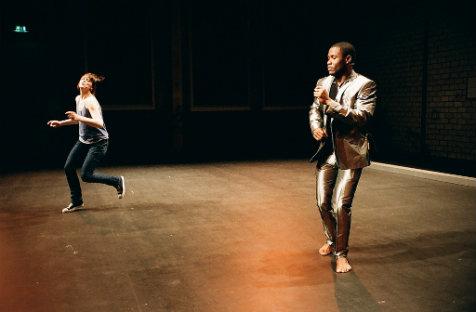In my experience, performances in Sydney don’t start at precisely the advertised time; there’s always been a few minutes to accommodate the last-minute dashers and the loiterers at the bar. Except, since last Friday at Carriageworks, I have to qualify that ‘always’ with an ‘almost’. German punctuality clashed with Aussie tardiness as the touring show Othello C’est Qui began at 7:30 sharp, and a steady stream of stragglers walked in to hover awkwardly in the corner and wait for an appropriate moment to walk across the front of the stage to take their seats.
Luckily, the duo on stage, Franck Edmon Yao and Cornelia Dörr, took the interruption in their stride, cheerfully telling the latecomers to take their time. It’s not the kind of show that requires silence and darkness to cast its spell. The actors begin by chatting about the role of Othello, in which Yao has supposedly been cast; it’s never quite clear whether the actors are speaking as themselves (when Dörr talks about the theatre, she refers to playing some of the roles mentioned under her credits in the programme), as characters who are also actors within the world of the show, as Othello and Desdemonda – or rather as archetypes of jealous man and innocent woman – or often as stereotypical amalgamations of characteristics associated with their racial and cultural identities (black African and white German).
That last element is where most of the humour comes from. It’s broad humour, only a few shades more subtle than Fat Pizza. But it’s also pretty funny. Yao thinks white people are obsessed with sex because of their public displays of affection; Dörr thinks it’s the other way around, because black people dance sensually and dress revealingly. They argue at cross-purposes, the sense of culture clash heightened by the fact Yao speaks only in French, interpreted in real time by Dörr (sometimes, when he ad libs, she has to slow the show down to think of the right English word). There’s some ‘white people can’t dance’ jokes and Yao does a pantomime of an African discotheque.
It’s not challenging stuff, but it’s entertaining enough. It’s when they relate their national caricatures to the characters of Othello that the piece is most disappointing. When Yao is cast as Othello, he comments on the fact that the character is so well-known to Europeans, but Africans have no idea who he is. It’s a promising and intriguing angle. But the way in which he discovers Othello seems to be by finding that part of his own character that is bound up with honour and susceptible to jealous rage. If there is a message, it seems to be that Yao’s character, as an African, carries the soul of Othello within himself.
I’m not objecting to that on PC grounds. It’s not so much that this is essentialist nonsense (it may well be that there’s some clever riffing on stereotypes to subversive effect, but if so, it went way over my head). What I do find objectionable is the laziness. The piece takes the most obvious and easy route possible from Yao’s character to Othello. In the process, an opportunity is squandered. It’s a shame, as Yao and Dörr are capable and charismatic performers. I’d be keen to see what they made of the actual parts in Othello. Until then, Othello c’est qui? is still an open question.
Rating: 3 stars out of 5
Othello C’est Qui
Gintersdorfer / Klaßen
Carriageworks, Eveleigh
11 – 14 January
Sydney Festival 2013
www.sydneyfestival.org.au
5 – 27 January





